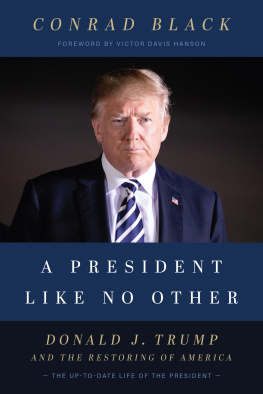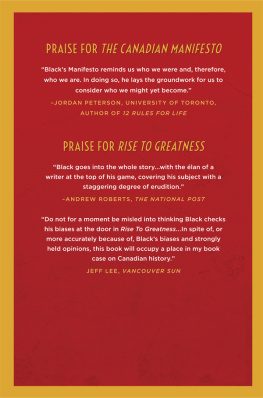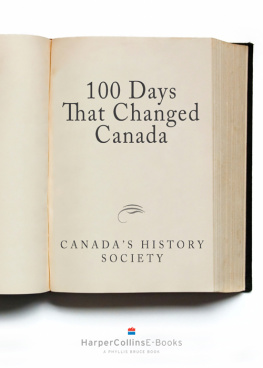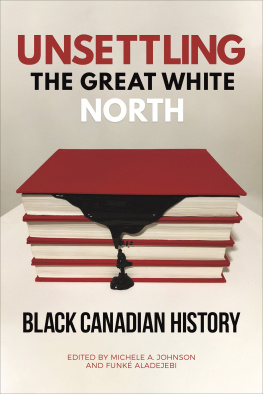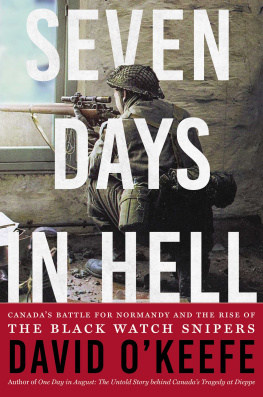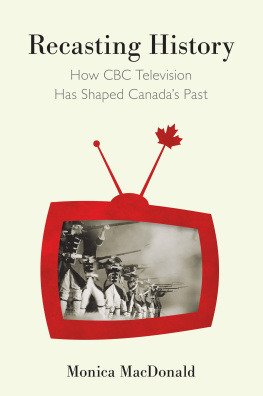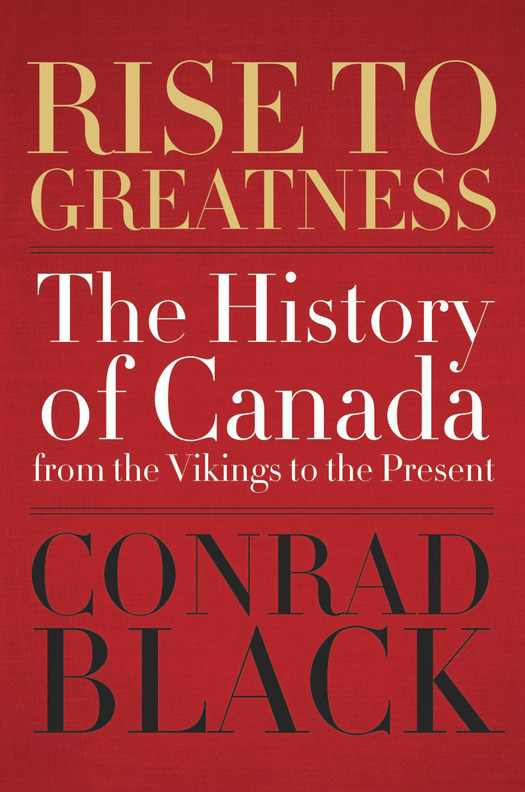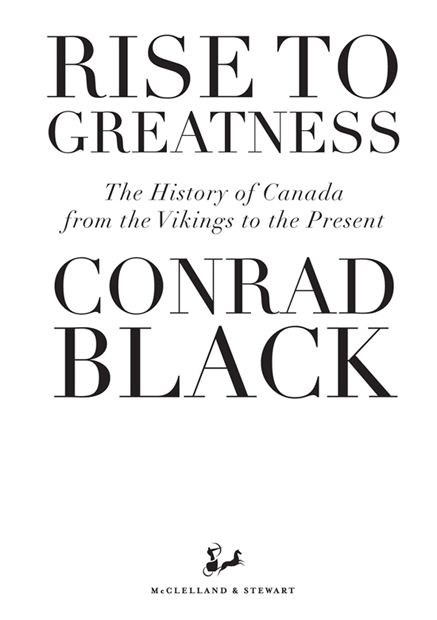ALSO BY CONRAD BLACK
Render Unto Caesar: The Life and Legacy of Maurice Duplessis
A Life in Progress
Franklin Delano Roosevelt: Champion of Freedom
The Invincible Quest: The Life of Richard Milhous Nixon
A Matter of Principle
Flight of the Eagle: A Strategic History of the United States
COPYRIGHT 2014 BY CONRAD BLACK CAPITAL CORPORATION
All rights reserved. The use of any part of this publication reproduced, transmitted in any form or by any means, electronic, mechanical, photocopying, recording, or otherwise, or stored in a retrieval system, without the prior written consent of the publisher or, in case of photocopying or other reprographic copying, a licence from the Canadian Copyright Licensing Agency is an infringement of the copyright law.
LIBRARY AND ARCHIVES CANADA CATALOGUING IN PUBLICATION
Black, Conrad, author
Rise to greatness : the history of Canada from the Vikings to the present / Conrad Black.
Includes bibliographical references.
ISBN 978-0-7710-1354-6 (bound). ISBN 978-0-7710-1355-3 (html)
1. Canada History. I. Title.
FC 165. B 53 2014 971 C 2014-904644-8
C 2014-904645-6
Published simultaneously in the United States of America by
McClelland & Stewart, a division of Random House of Canada Limited
Library of Congress Control Number: 2014944153
Every effort has been made to trace copyright holders and to obtain their permission for use of copyrighted material.
The excerpt from Canada: Case History: 1945 by Earle Birney is taken from One Muddy Hand: Selected Poems, Harbour Publishing, 2006, www.harbourpublishing.com. Reprinted by permission.
The poem W.L.M.K. by F.R. Scott has been reprinted with the permission of William Toye, literary executor for the estate of F.R. Scott.
Cover and text design by CS Richardson
McClelland & Stewart,
a division of Random House of Canada Limited,
a Penguin Random House Company
www.randomhouse.ca
v3.1
To these dear friends, by agreement in each case, all of whom assisted me in different ways with this book:
P AUL G. D ESMARAIS (19272013)
P AUL J OHNSON
G EORGE J ONAS
M. B RIAN M ULRONEY
J OHN N. T URNER
G EORGE (L ORD ) W EIDENFELD
Acknowledgements
T HANKS IN PARTICULAR , and for the sixth consecutive publication, to Barbara for her customary forbearance and to my close associate, Joan Maida, for her patient and efficient help, and thanks also to Doug Pepper and Jenny Bradshaw and their colleagues at Penguin Random House Canada. Others who have been helpful are very numerous, including those to whom the book is dedicated. Many can be deduced from the text as it has been my privilege to know a large number of the personalities prominent in the last fifty years of the narrative. I am deeply grateful to all who have assisted me.
Foreword
W HEN I SUGGESTED TO C ONRAD B LACK that he should write a history of Canada, I knew that, if he accepted the idea, he would do it well. I had no idea that he would do it so quickly. I should have known better. Black is a man of decision. Once he has decided to do a thing, nothing is allowed to stand in his way. Having agreed with me that a history of Canada was needed, he set to. He was well, indeed superbly, qualified for the job. He has been a successful businessman. He has been an outstanding newspaper owner. He has been involved in politics at local, national and international levels. He is wonderfully articulate, and a man who sees things with remarkable clarity. Not least he is subtle.
I stress subtlety because the history of Canada is a study in understatement. It is an enormous country, like the United States. But whereas, in America, everything that happens is proclaimed from the house-tops, printed in capital letters, painted in technicolour and reverberates with blood and thunder, Canadian history rarely rises above a whisper. Its story is fascinating but it is written in lower case. It has produced many remarkable men and, increasingly, women. But in the theatre of the world they seldom take centre stage. Its very size underlines its character. Amid its huge prairies and limitless tundra, its boundless wastes of ice-floes and frozen seas, the outstanding characteristic is silence. One must listen, and listen hard. And what emerges is paradox.
Canada is like one of those banks said to be too big to go bust. Its sheer enormity saved it from outright conquest by any one state. Wrested from its native population by Samuel de Champlain whose extraordinary life is an epic in itself its very size in the eighteenth century proved too much for France to hold during a period of British naval supremacy. Yet equally the British were obliged to compromise with its French-speaking inhabitants to keep it against the manifest destiny of the United States. This bargain, the first in the history of colonialism and the most enduring was the prototype of many such in Canadas two centuries of trade-offs and peaceful adjustments. Under a British flag Canada was able to avoid absorption in America until the aggressive moment had passed, and experiments in federation had taken root. The history of Canada during the nineteenth century and even the twentieth contains many anxious periods, and moments of near disaster, but catastrophe was always avoided, and the prevailing language of her march through the decades is one of concession and yielding, conciliation, rapprochement, mending and mediation, patching, healing and setting right. Studied closely, Canadian history reveals much heroism in detail, but a heroism enacted quietly and with the minimum of histrionics.
Black recounts this progress with a lively satisfaction and often with humour, but he also narrates an accompanying saga of Canadas emergence in the world as a model of calm common sense, good government and quiet rectitude. Canada, like all countries, has made mistakes and Black points them out but she has seldom persisted in foolishness, and her record of learning from error, and not making the same mistake twice, is exemplary. Amid the deafening clamour of strident voices on the world scene, Canadas has somehow contrived to make its own calm contribution listened to and even heeded. In recent years, indeed, Canadas influence in the world has grown steadily, and with justice.
Canada, as the saying goes, always punches above her weight, as the experience of two world wars plainly shows, though the metaphor ill pertains to a country always anxious to avoid the language of conflict. It is perhaps lucky that Canada, unlike Australia, never took up the English national game, cricket, a pastime characterized by long soporific spells punctuated by periods of raucous bellicosity. Canada chose, instead, to excel uncontroversially at ice-hockey.
When I was a boy, the great thing I knew about Canada all English boys in the 1930s knew it, and rejoiced in it was the existence of the Royal Canadian Mounted Police, the Mounties. It may now seem archaic, for it is Royal and horse-bound. But it did, and still does, conjure up an image of security and manliness, of bringing order in a wild country and doing it with a touch of romance. The Mounties always get their man is a splendid phrase Canada has given the world, and the Mounties add a touch of colour to a country whose history is, as a rule, reassuringly monochrome.


